A system is now in place to grant inaccurate and exaggerated ‘anti-Zionist’ claims credibility by giving them a university press imprimatur, claims Cary Nelson. Unchecked, this development will corrupt the fundamental purpose of higher education — the pursuit of truth. This is happening against the horrific background of the recent Pittsburgh and San Diego synagogue murders. The escalating demonisation of Israel by faculty and students now risks more than symbolic consequences.
Introduction: Why is academia vulnerable?
We are confronting a new level of assault from faculty allies of the Boycott, Divestment and Sanctions (BDS) movement. I respond to this trend in my new book entitled Israel Denial: Anti-Zionism, Anti-Semitism, and the Faculty Campaign Against the Jewish State. I want to summarise and expand on some of the book’s arguments here. Israel Denial seeks to occupy a political space in which fierce opposition to BDS ‘scholarship’ is paired with practical proposals for how to make progress toward a two-state solution, a space in which teaching, writing, and public advocacy that promotes mutual understanding and offers practical solutions to the conflict can thrive.
I have already had people who have read it from the centre-left perspective tell me that they like the peace proposals but not the critiques of faculty BDS advocacy. Well, I can give no quarter to BDS and I yield to no one in my dislike of the movement. People from the centre-right perspective tell me that they like the attacks on BDS pseudo-scholarship but not the peace proposals. During a presentation on the unilateral withdrawal from the West Bank that I gave at the University of Illinois at Urbana-Champaign, some community members walked out in anger. I was later told that it would be unacceptable for me to present such ideas at the local synagogue.
But as I say in the introduction to the book, I am not attempting to make things easier for anybody, including myself. The BDS movement does not offer peace proposals. It obstructs negotiations with its ‘anti-normalisation’ campaign and promotes demands which no Israeli government could accept, including the demand for a ‘right of return’ for 7 million Palestinian descendants, or the demand to tear down the security barrier which would lead to Hamas cells infiltrating schools, restaurants, synagogues, homes, shopping malls, and airports. Yes, some one-state supporters will cry out at every annual J-Street conference, ‘Of Course They Can All Just Get Along!’ But many of us will not contribute to a bloodbath in the name of idealism.
On campus, the hard sciences have no interest in the BDS movement that opposes Israel. But numerous soft social science disciplines, allied with a segment of left academia, have made themselves uniquely vulnerable to BDS’s ideological inducements. There is a long history behind this development. As many have noted, and Susie Linfield reminds us in her valuable book The Lion’s Den: Zionism and the Left from Hannah Arendt to Noam Chomsky, for prior left generations, ‘the creation of the State of Israel and the fight for its independence were a seamless continuation of their previous struggles: they compared the Haganah to the Loyalists [the Republicans who fought Franco] in Spain’. However, once the Left ‘moved from defining itself as anti-fascist to defining itself as anti-imperialist, and to the identification of the formerly colonised peoples of the Third World as the main agents of social justice’, it became vulnerable to claims that this dichotomy applied to Israelis and Palestinians.
After the 1967 Six-Day War, ‘Israel was almost instantly transformed into the colonialist-racist-imperialist-fascist oppressor, while the Palestinians were anointed as revolutionary-socialist-Marxist-Leninist-anti-imperialist freedom fighters’. Hostility towards Zionism ‘became the Left’s “answer”, albeit a contorted and dishonest one, to one of the Left’s fundamental postwar questions: How can we maintain our traditional universalist values in light of the nationalist movements sweeping the formerly colonised world?’ That challenge underwrites Judith Butler’s particularly unrealistic idealist viewpoint. On campus, observes Linfield, we are continually confronted by ‘the impossibility of analysing the Arab-Israeli conflict when a major aspect of it is swathed in idealisation or ignorance’.
BDS is corrupting academia
Although the Palestinians mollify the Left’s need for an innocent and oppressed group, both sides have been thoroughly compromised. The story of the Israelis and Palestinians cannot be fairly depicted as a Manichean struggle between good and evil. Yet that is exactly the story told in recent anti-Zionist teaching and publication.
The BDS movement continues to pass resolutions promoting boycotts of Israeli universities or urging divestment from companies doing business there. But outside the public’s gaze, the BDS movement has also been corrupting the core academic functions that sustain higher education.
BDS wins some campus votes and loses others. They all appear to be mere symbolism. No university board, for example, is going to let students decide its investment policy, and no administration has been willing to close down a study abroad programme. But every acrimonious debate wins hearts and minds, turning students and faculty into long-term anti-Zionists, convinced that there is nothing virtuous about the democratic and Jewish state. And in the process campus zealots are born. Those zealots can decide that a balanced education is an expendable campus priority. For faculty members, that can mean abandoning the fundamental search for truth and devoting their apolitical teaching and scholarship to propaganda.
The corruption of teaching
In Israel Denial, I examined course syllabi on the Israeli-Palestinian conflict across a number of US universities including the character of their reading assignments. I also considered public statements that the faculty member teaching the course had made about Zionism, Israel and the Israeli-Palestinian conflict and read their related published materials.
It became apparent that faculty members have become increasingly willing to declare their course’s political motivation. Thus, when Tufts University’s Thomas Abowd titles his 2018 course ‘Colonising Palestine,’ he is advertising its historical thesis. A decade ago, when Vassar’s Joshua Schreier taught ‘The Roots of the Palestine-Israel Conflict’ he felt it necessary to include a disclaimer highlighting his anti-Zionist perspective: ‘Students should keep in mind that this course is NOT designed to present an “objective” account of a “two-sided” conflict. The fact that there are two sides does not obligate us to portray each as equally right and/or equally wrong’. Such disclaimers seem to have largely disappeared. By the time Columbia University’s Joseph Massad offered ‘Palestinian and Israeli Politics and Societies’ in 2016, he could declare that its one-sided reading list ‘covers the history of Zionism’. Massad was already in print characterising Zionism as ‘Jewish supremacism’ and castigating ‘the foundational racism of Zionism and its concrete offspring, a racist Jewish state.’ He writes that ‘The Nazi precedent acts, not as a deterrent, but rather as a pedagogical model for the Israeli army’.
Sometimes, faculty publications not only document a teacher’s general political views but also their interpretation of some of the texts they assign in their courses. The mere fact of signing a BDS petition, however, is not enough to prove that a faculty member does biased teaching. It is a warning sign, but faculty should be capable of separating their political views from their teaching. It is the combination of syllabi, publications and public statements that provide sound evidence that a person cannot do so.
In 2015 and 2016, at UC Berkeley and UC Riverside, undergraduates were weaponised by anti-Zionist faculty members to teach courses hostile to Israel. The Berkeley course was ‘Palestine: A Settler-Colonial Inquiry.’ Riverside’s student-taught entry was ‘Palestine & Israel — Colonialism and Apartheid,’ which was retitled ‘Palestinian Voices’ after public protest. Unlike faulty-taught courses, academic freedom did not protect these student-taught courses from critical campus review. They should have been evaluated for historical accuracy.
The obvious question is: what can be done about politically motivated teaching by faculty, teaching that amounts to political indoctrination? Here one needs to be clear about the conditions established by academic freedom. If a department assigns a faculty member a course on the Israeli-Palestinian conflict, the faculty member is free to teach it from a particular political perspective. There is no requirement for ‘balance’. Students have to be permitted to present opposing views, but that freedom is not worth much if all the course readings are anti-Zionist. The one basis for sanctions against a faculty member is if they are promoting clear falsehoods.
Donors, politicians, alumni, and the general public are often frustrated that fiercely anti-Zionist faculty who attempt to indoctrinate their students cannot be made accountable. Firing a tenured faculty member is extraordinarily difficult. That said, neither tenure nor academic freedom guarantees anyone the right to teach particular courses. If a department decides you are a ruthless ideologue about Israel, they can assign you to teach something else. Of course, some academic departments are composed entirely of anti-Zionists, and worse still, so are some academic disciplines. They are obviously not going to reassign a faculty member teaching a course like Massad’s.
The American Association of University Professors (AAUP) has used ‘the prevailing disciplinary consensus’ as a standard for faculty views that cannot be sanctioned. But the prevailing view in fields like Middle Eastern Studies and Women’s Studies is that Israel is an apartheid, colonialist, white supremacist state, and that Zionism equals racism. The anti-Zionist consensus in other fields continues to grow and irrational and discriminatory anti-Zionism is now academically protected speech in several disciplines and sub-disciplines. When someone is applying for a job you can reject them for pretty much any reason you want, as long as you use caution in what you write. And an ideologue can be turned down for tenure, just as can someone who fails to provide evidence supporting their claims. But the AAUP has never considered the possibility that the majority of the members of an entire academic discipline could choose partisan politics over the search for truth. Yet that is the reality we now confront. We have lived for decades under the principle that academic disciplines should and would police themselves, that reason would prevail and academic disciples would prove to be self-correcting. There is no longer any basis for faith in that principle. Indeed, we now watch matters get worse, as anti-Zionist sentiment in some disciplines solidifies, and faculty members consistently conform to it.
There may, however, be grounds for curtailing teaching that clearly promotes false or unsubstantiated claims. That could include a campus-level sanction in the form of preventing a faculty member from teaching in a given subject area. The national AAUP has too many anti-Zionist Jewish people in staff and leadership positions to expect it to support such an agenda. They might well resist. But I think there are cases where action on AAUP grounds — professional competence — could be explored nonetheless. Several such cases are detailed in my book. Were Jasbir Puar to tell her students that Israel has been deliberately stunting the growth of Palestinian children, an example I summarise below, I think she could well be judged incompetent to teach about the Israeli-Palestinian conflict. Oberlin’s Joy Karega is not the only faculty member who promoted anti-Semitic September 11 conspiracy theories. She was vulnerable to being fired because she was untenured, but I am not convinced tenure c should protect lunacy. Meanwhile, university presses must be held to a higher standard of evidence. For that, we need an organised campaign.
A preference for pluralism
Each university has a responsibility to assure that the campus curriculum offers a variety of historical and political perspectives. If a given department offers only anti-Zionist courses, the administration should make certain that alternative views are provided in other programmes. If necessary, new faculty should be hired to ensure political diversity in course content. Academic freedom does not protect faculty-taught courses from criticism. Everyone should feel free to comment on politically motivated courses. Academia is based on the belief that publications must be freely debated, but we have sheltered teaching from comparable discussion. That distinction should no longer be sustained. It is not a good idea to leave pedagogical debate to members of the public who are less informed.
Donors who want to fund better courses need to be cautious. AAUP policy is that a donor cannot control either who gets appointed to an externally funded faculty appointment or what that appointee’s politics is. The example I like to give is that you could fund a named professorship in political economy and a university could appoint a Marxist economist to the position. Academic freedom gives the faculty authority over academic appointments. What that means is that a donor who wants to fund a faculty appointment either sympathetic to Israel or supportive of a two-state solution needs to be very careful what programme they donate to. Middle Eastern Studies is not a good funding destination; neither is Jewish Studies at the University of California, Los Angeles or the University of Illinois at Urbana-Champaign. However, research universities or liberal arts colleges are more likely to honour the principle of academic freedom whilst others do not always do so. A large existing campus endowment sometimes frees a campus to put principle first, although it can make infinite greed the governing priority of board and administration.
My own recommendation would not be to counter anti-Zionist courses with Zionist ones, but rather to offer courses that expose students to both points of view. My aim is not to set up a situation where students are asked to choose one side or the other, but rather to encourage empathy, mutual understanding and mastery of historical complexity. In Israel Denial, I include as an example a chapter detailing a course that includes both Israeli and Palestinian poetry, exposing students to a range of personal testimonies from across the political spectrum.
The corruption of scholarship
If politicised teaching has an immediate effect on student attitudes, the effects of anti-Zionist scholarship are in some ways deeper and more long lasting. The politicisation of humanities ‘scholarship’ has been especially corrosive. More accustomed to matters of interpretation, some soft social science disciplines do not have established fact checking traditions. Literary studies, ethnic studies, anthropology, and women’s studies, among others, have increasingly lost the ability to make that distinction, even as they expand the range of issues they feel qualify to study. Unlike those in the hard sciences, some humanities faculty members have no idea how to gather evidence or to question their confirmation bias. Despite spending years studying this problem, I am unable to understand fully how faculty members can pursue claims that any Google search would disprove. And yet it happens.
What I do know, however, is how false and unsubstantiated claims get published in books or essays. A journal editor, like W. J. T. Michell at the University of Chicago’s Critical Inquiry, signs on to the BDS movement and then finds anti-Zionist submissions inherently persuasive. A university press director, like Duke’s Ken Wissoker, in the process of retiring, follows the same evolution. Peer reviewing is supposed to provide quality control and to operate as a check on publishing propaganda. But once a university press publishes several anti-Zionist books it has a chorus of manuscript reviewers ready to praise sloppy or biased work and recommend publication.
Case Study: Jasbir Puar’s The Right to Maim
So when Rutgers Women’s Studies professor Jasbir Puar submitted The Right to Maim (2017), a book more akin to science fiction fantasy than research, Duke’s readers and press staff saw no problem with its unsupported arguments. Puar asserts that Israel has long been stunting the growth of Palestinian children by blocking adequate food shipments to Gaza and the West Bank. The international standard for identifying when stunting (two or more standard deviations below normal height at one-to-five years of age for a given population) is a serious public health problem is when 20 per cent of children are affected. This list of area countries that exceed that level is long, among them Algeria (11.1 per cent), Lebanon (12.2 per cent), Libya (14.9 per cent), Egypt (19.8 per cent), Syria (23.4 per cent), and Yemen (44.3 per cent), along with several in sub-Saharan Africa. But UNICEF, the World Health Organisation, and the Palestinian Authority, report that stunting rates in the West Bank and Gaza are at approximately 7 per cent and 10 per cent. The same authorities report that Palestinian food supplies are adequate. If Israelis are working hard to stunt the growth of Palestinian children, they are doing an exceptionally poor job.
As important as these statistics are, they need to be supplemented by an understanding of the main causes of childhood stunting: inadequate nutrition, beginning in pregnancy, and consanguineous marriage. The Palestinian Authority and health experts I consulted in Gaza and the West Bank agree that food supplies are adequate. I have found no public health study that suggests otherwise. As in the US, where 20 per cent of children are food insecure, however, poverty does make it difficult for some parents to provide quality nutrition. The Palestinian Authority promotes micronutrient supplementation to help, and international agencies supply food aid. As studies by Palestinian researchers and others document, consanguineous marriageproduces several health consequences, including deafness, eye disease, and stunting. Some forty per cent of marriages in Gaza are consanguineous. Education to explain the risks needs to be improved.
The 14 June international edition of The New York Times includes a front-page article by Nicholas Kristof (‘A burger for $295 is plain wrong’) that contrasts obscene consumption in New York and elsewhere with the brutal fact of widespread childhood stunting in some parts of the world: ‘Here in Guatemala, almost half of children are stunted.’ Stunting is a genuine health crisis in some countries, one that could be eliminated. Even in Gaza and the West Bank, where Palestinian health officials report it is not a crisis, rates can and should be reduced, but not by denouncing a Zionist conspiracy that does not exist.
Case Study: Critical Inquiry
Academic journals can be equally deplorable. In December 2017, Critical Inquiry published its third long anti-Zionist essay by UCLA English Professor Saree Makdisi, ‘Apartheid / Apartheid / [ ].’ The blatant falsehoods contained in the article are remarkable. He echoes the false claim in his 2010 book Palestine Inside Out that none of Israel’s Basic Laws guarantee equality for all Israeli citizens.. In Israel Denial: Anti-Zionism, I quote laws and numerous Israeli High Court decisions that have reinforced them and applied them to the specific issues of women’s rights and Arab rights.
Makdisi’s misrepresentation of Israeli law is a large-scale deception. But he engages in a number of lesser deceptions as well. In his 2017 essay, he claims that the Bedouin (he says Arab) village of Arab Al-Na’im in the Galilee never received official recognition, though it actually received it in 2000. He deplores the tin homes they live in, but construction permits for masonry homes were approved in 2013, and construction began the following year, well before he submitted his essay to W. J. T. Mitchell. By the time I visited the village in May 2018, one hundred masonry homes were occupied or under construction. My partner Paula Treichler photographed several for my book. Once again, an internet search would have sufficed to alert either Makdisi or Mitchell to the error.
Universities libraries make far more elaborate searches easy. You type in ‘stunting’ or ‘Basic Laws + Israel’ and gain access to academic publications not available from public search engines. I print them out from my home computer, then read and annotate. All this takes time, but you do not need preexisting expertise to acquire knowledge.
A whole system is now in place to grant delusional anti-Zionist claims credibility by giving them a university press imprimatur. Any confidence that this corruption of the fundamental purpose of higher education — the pursuit of truth — will not spread to other areas of inquiry is almost certainly unfounded. Hatred of Israel is beginning to undermine the mission of the academy. Materials establish the positions that shape academic disciplines and inform public policy. Anti-Zionist teaching recruits students to those views and sends them into the world to enter the professions. Academic freedom was defined in the US one hundred years ago to protect faculty members from retaliation when they pursue truths that prove controversial. When faculty teaching is manipulative and faculty publications wholly unreliable, the cost is substantial.
Conclusion: From Discourse to Violence
Everything that happens regarding Israel and Jews in the academy now occurs against the horrific background of the recent Pittsburgh and San Diego synagogue murders. The escalating demonisation of Israel now carries with it a new level of threat. The politics of symbolic protest thus seems newly consequential. Whether it is the chanting of the familiar slogan of choice — ’Palestine shall be free from the river to the sea’ — or the recent demands by BDS advocates to exclude Zionists from progressive causes and organisations, the sense that hostility is intensifying is experienced viscerally by many Jewish people. It is impossible to be certain that unbridled hatred against Israel, with its accompanying claims about conspiratorial American Jewish power, will not have disastrous consequences in the academy.
When BDS intensifies its attacks on Israel, claiming, for example, that Israel is engaged in genocide, it is clear that anti-Zionism has become the socially acceptable face of anti-Semitism. The lesser forms of campus anti-Zionist aggression — from painting swastikas on walls to shouting down pro-Israeli speakers to distributing fake ‘eviction notices’ to Jewish students — have always echoed the long history of anti-Semitism. Or at least they did for those who cared. But events have now made the echoes inescapable. As anti-Semitism increases in Europe and North America, no one on campus can now say ‘It can’t happen here.’ The fact that demonisation of Israel and violence against Jews can feed on one another is inescapable.


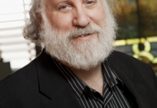

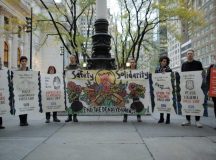
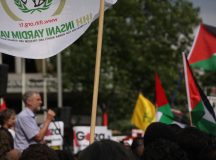
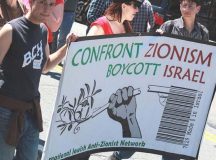
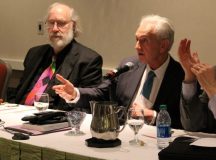
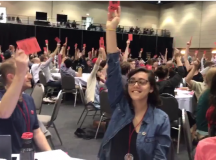































The Zionists have used boycotts against Germany both before WWI and WWII. They chose boycotting because it can be a powerful, and many times, the only weapon inferior forces have at their disposal. Why is it now a sin to boycott Israel for its crimes? this is just more hypocrisy in the defense of what is now a fascist state.
Anyone who still believes in a two-state solution is totally ignorant of reality. A two-state solution was never in the cards. Israel has already admitted it. They just went along with it to keep American money flowing and to give the appearance of cooperation. They seem to have fooled only non-thinking academics who still cling to this fable.
Why would I even begin to take this author and his book seriously when he does not have a grip on present reality and also of Israel’s history of mistreatment of the millions of “free” Palestinians being held prisoner in their own country.